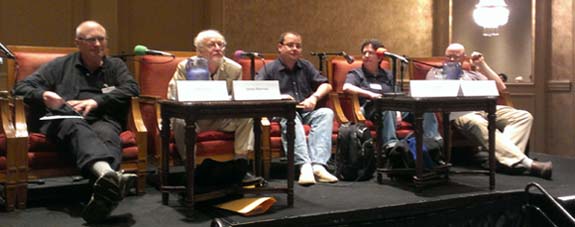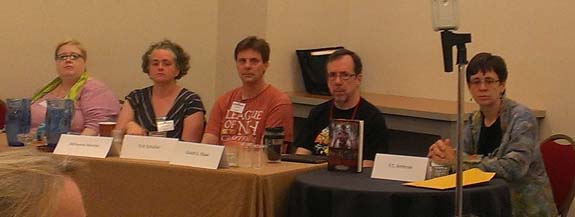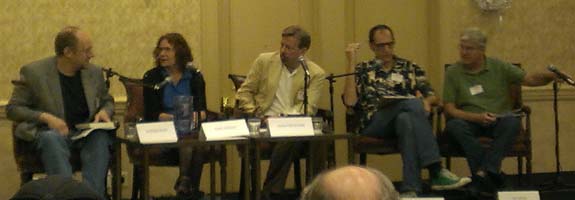Readercon 24 – July 12, 2013 – Friday
Morning is not as fun as you’d think it would be when you’re sleep deprived. Just took a while to settle down once we were in last night. The hallways were quiet but some banging started outside our window pretty early in the morning — nothing out there on the roof except the usual hotel roof equipment. Could not figure what it was but it was from that area. Eventually gave up and got up.
Got to registration and got our name tags, program book, and other stuff. Also this year the con is using an electronic program guide that you down load onto smart phone, a notepad (iPad or equivalent) and it stays even when you loose connectivity. It lists program items, participants, and the program descriptions. If you click on a panelist you get that person’s bio. If you click on the box next to a program item it puts that item on MyCon so you have a list that’s just the things you want to go to so you don’t get confused looking things up.
We had to get books out of the car for one of the booksellers and noted that the crack in the windshield hadn’t grown any while sitting in the parking lot. In the evening, we went to get into the car to go out to dinner and found that the crack had grown about 2 inch since we’d last looked at it. So, we added more crazy glue. The local dealership called back and said they don’t do window replacements and didn’t have any local glass people to recommend. So, we’re trying to hold out until we get home and to our own dealership and local businesses.
Now here’s the program items we went to today:

Faux Estrangement in Fantasy Panel
11:00 AM – Comforting Fiction: Faux Estrangement in Fantasy
Panel: John Clute, James Morrow, Graham Sleight, Ruth Sternglantz, and John Stevens (leader)
Description: In 2011 China Miéville, discussing literature of estrangement and literature of recognition, referred to “the clichés of some fantasy” as “faux estrangement.” Yet these clichéd, faux-estranging works are often tremendously popular. What’s so appealing to writers and to readers about recognition disguised as estrangement?
This was an interesting panel with far ranging discussions about estrangement, faux estrangement, and recognition. It’s really hard to capsulize the conversation so I won’t try. I suggest you read the articles by China Mieville and then come back and leave a comment:

What the Future Is and What the Future Is Not Panel
1:00 PM – What the Future Is and What the Future Is Not
Panel: John Crowley, Glenn Grant, John Shirley, Bud Sparhawk, and Vincent McCaffrey (leader).
Description: While looking backward, we can examine a past moment in time. Much of what we find there is with us today: part of our lives at present. Were we prescient enough, we could predict things and ways that would survive from our present into the future. Successful predictions would make our children rich, could make us famous (or infamous), and might change the world to come. This open discussion, led by Vincent McCaffrey, will attempt to predict which ideas, things, and methods will be useful or meaningful parts of the lives of those yet to come.
Talk ranged over nuclear weapons, global warming/climate change, surveillance technology and it’s uses and, of course robots. They also stressed that the future isn’t here yet and when it is here it’s today so everything they talk about is simply speculation and guessing.

Knit One, Print Two Panel
3:00 PM – Knit One, Print Two: Handicrafts, Replicators, and the Future of Making
Panel: Natalie Luhrs, Adrienne Martini (leader), Eric Schaller, David G. Shaw, and E.C. Ambrose.
Description: Take your average 21st-century American knitter on board the Enterprise and the first thing they’d do is replicate a heap of yarn and some needles, or roving and a wheel to spin it with. The replicator might obviate the need for real plants and animals as sources for raw materials, but not the desire of people to create beauty out of those raw materials, or just to do something with their hands on long trips. Given this, why do we almost never see handicrafts in SF futures with replicators? What can futurists learn from the recent simultaneous booms of 3D printers (which are arguably proto-replicators) and handicrafts, both under the header of “making” and often employed and enjoyed by the same people?
There was a lot of discussion about the need to create and whether a replicator that can make what you want would essentially snuff out the desire to make items with our own hands (no likely). There was some talk about how artisans and craftsworkers are important to society and in some potential post-apocalyptic events could become essential for us to survive. Also how wealth allows people to do crafts, gardening, wine making, etc. because you need money to get started.

Questioning the Ostensibly Reliable Narrator Panel
4:00 PM – Questioning the Ostensibly Reliable Narrator
Ian Randal Strock, Sheila Williams, James Patrick Kelly (leader), John Kessel, and Rick Wilber.
Description: In a recent Locus roundtable discussion, several authors and critics agreed that, in Andy Duncan’s words, “all fictional narrators are, to some extent, unreliable.” Some may be deliberate liars; some may be prevaricators omitting crucial information (as in Agatha Christie’s The Murder of Roger Ackroyd); some may believe themselves to be reliable (such as Doyle’s Dr. Watson); and some may distrust their own perceptions (such as Imp in Caitlín R. Kiernan’s The Drowning Girl). How does fiction featuring supposedly reliable narrators change when it’s approached by a reader who questions everything they’re told?
This was one of the most interesting, informative, and thought provoking panels of the day (genetics was a close second). Just how important is a reliable narrator and how does it impact the reader when the narrator is unreliable. Can a 3rd person narrator be unrealiable? (This took up a bit of the time.) What about when the 3rd person narrator becomes so close that it collapses close 3rd person into a character?
One factor I found interesting was whether an unreliable narrator who detailed exactly what happened really unreliable if his/her interpretation of events does not mesh with ours (in our present time and societal beliefs).
8:00 PM – Genetics
Lecturer: Michael Blumlein
Description: If the genetic code is the musical score, then epigenetics is the music. Our genetic sequence is only part of the story. The other part is how and when and why any particular gene is turned on or off and how these genes interact. This is the science of epigenetics. Unlike the fixed genetic “code,” epigenetics is fluid. It changes in response to any number of factors, and it can evolve and adapt rapidly. Can such rapid changes be inherited? Can inheritance be driven by purpose, as Lamarck believed, or is it always the product of random chance? Dr. Michael Blumlein will explore these and other questions of genetics, epigenetics, and what lies beyond.
Epigenetics is about the bits that turn things on and off and how it fits together with traditional genetics which we all learned about it school. If I tried to put the lecture in any short form I’d just mess it up so the first sentence is my best attempt. But it was very interesting and I’ll certainly be looking into this subject more later.




